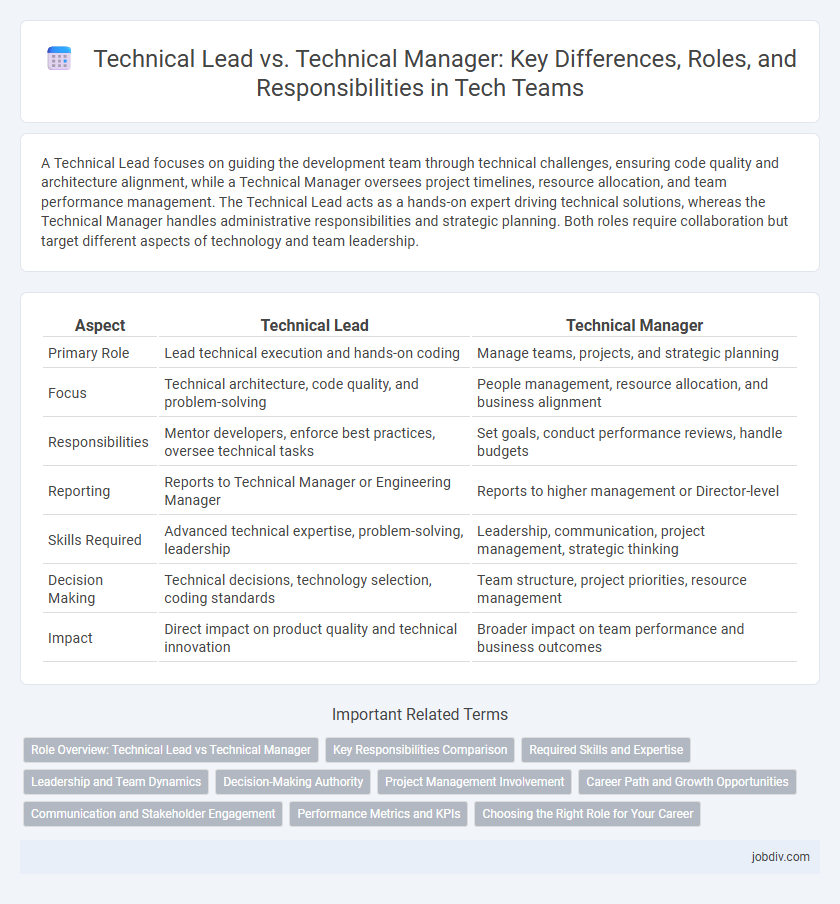A Technical Lead focuses on guiding the development team through technical challenges, ensuring code quality and architecture alignment, while a Technical Manager oversees project timelines, resource allocation, and team performance management. The Technical Lead acts as a hands-on expert driving technical solutions, whereas the Technical Manager handles administrative responsibilities and strategic planning. Both roles require collaboration but target different aspects of technology and team leadership.
Table of Comparison
| Aspect | Technical Lead | Technical Manager |
|---|---|---|
| Primary Role | Lead technical execution and hands-on coding | Manage teams, projects, and strategic planning |
| Focus | Technical architecture, code quality, and problem-solving | People management, resource allocation, and business alignment |
| Responsibilities | Mentor developers, enforce best practices, oversee technical tasks | Set goals, conduct performance reviews, handle budgets |
| Reporting | Reports to Technical Manager or Engineering Manager | Reports to higher management or Director-level |
| Skills Required | Advanced technical expertise, problem-solving, leadership | Leadership, communication, project management, strategic thinking |
| Decision Making | Technical decisions, technology selection, coding standards | Team structure, project priorities, resource management |
| Impact | Direct impact on product quality and technical innovation | Broader impact on team performance and business outcomes |
Role Overview: Technical Lead vs Technical Manager
A Technical Lead primarily focuses on guiding the engineering team through hands-on technical expertise, code reviews, and architectural decision-making to ensure high-quality software delivery. In contrast, a Technical Manager oversees project timelines, resource allocation, and team development, balancing technical insight with managerial responsibilities to drive overall project success. Both roles require strong communication skills, but the Technical Lead emphasizes technical problem-solving while the Technical Manager prioritizes strategic planning and team leadership.
Key Responsibilities Comparison
Technical Leads primarily focus on guiding development teams through hands-on coding, code reviews, and technical decision-making to ensure software quality and project milestones are met. Technical Managers handle resource allocation, team performance evaluations, project budgeting, and cross-department communication to align technical output with business objectives. Both roles require strong leadership, but Technical Leads emphasize technical expertise while Technical Managers prioritize strategic planning and team management.
Required Skills and Expertise
Technical Leads require deep expertise in software architecture, coding standards, and problem-solving to guide development teams effectively. Technical Managers need strong skills in project management, team leadership, and resource allocation to oversee project delivery and align technical goals with business objectives. Both roles demand proficiency in communication, stakeholder management, and an understanding of technology trends to ensure successful project outcomes.
Leadership and Team Dynamics
Technical Leads focus on guiding software development teams through hands-on coding expertise and mentoring, ensuring alignment with technical standards and project goals. Technical Managers emphasize strategic planning, resource allocation, and fostering cross-functional collaboration to optimize team productivity and project delivery. Leadership in Technical Leads is rooted in technical authority and problem-solving, while Technical Managers prioritize organizational leadership and team dynamics management.
Decision-Making Authority
Technical Leads typically hold decision-making authority over project architecture, coding standards, and technical problem-solving, directly influencing day-to-day development activities. Technical Managers possess broader decision-making power, including resource allocation, personnel management, and strategic planning, affecting team organization and project timelines. The hierarchy positions Technical Managers as key decision-makers for business objectives, while Technical Leads focus on ensuring technical excellence within those objectives.
Project Management Involvement
Technical Leads focus on hands-on project management by directly overseeing development tasks, ensuring code quality, and aligning technical solutions with project goals. Technical Managers emphasize broader project oversight, resource allocation, and cross-team coordination to meet deadlines and business objectives. The distinction lies in the Technical Lead's detailed execution role versus the Technical Manager's strategic planning and stakeholder communication responsibilities.
Career Path and Growth Opportunities
Technical Leads specialize in hands-on project execution and team guidance, deepening their expertise in software architecture and coding practices, which positions them for roles such as Principal Engineer or Solutions Architect. Technical Managers transition from technical tasks to strategic oversight, focusing on team management, resource allocation, and cross-department coordination, opening pathways to senior management or director-level positions. Career growth for Technical Leads emphasizes advanced technical skills and innovation leadership, while Technical Managers develop leadership, organizational, and business acumen to drive larger-scale impact.
Communication and Stakeholder Engagement
Technical Leads excel in direct communication with development teams, ensuring clear articulation of technical requirements and immediate issue resolution. Technical Managers prioritize broader stakeholder engagement, facilitating cross-functional collaboration and aligning project goals with business objectives. Mastery in both roles demands nuanced communication strategies tailored to technical execution and strategic stakeholder alignment.
Performance Metrics and KPIs
Technical Leads primarily focus on performance metrics related to code quality, deployment frequency, and system reliability, directly influencing the engineering team's output and technical excellence. Technical Managers emphasize KPIs such as project delivery timelines, team productivity, and resource allocation efficiency, ensuring alignment with business objectives and stakeholder expectations. Both roles utilize metrics like incident response time and team satisfaction scores but differ in scope, with Technical Leads concentrating on technical deliverables and Technical Managers on overall project success.
Choosing the Right Role for Your Career
Choosing between a Technical Lead and a Technical Manager role depends on your strengths and career goals; Technical Leads focus on hands-on coding, system design, and mentoring engineers, while Technical Managers prioritize project management, cross-team collaboration, and strategic planning. Understanding the impact of each role on product delivery and team dynamics helps align your career path with your skills in technology versus people management. Evaluating long-term objectives, such as desire for technical depth or leadership breadth, is crucial for making informed decisions in the software engineering hierarchy.
Technical Lead vs Technical Manager Infographic

 jobdiv.com
jobdiv.com